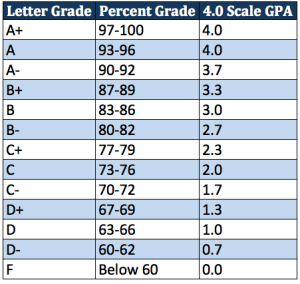On Take Your Success, I regularly interview top-performing college students to understand how they’re successful, so you can recreate the success in your life. Take what’s helpful, dismiss what’s not!
This week’s interview is with Yousra Jouglaf. She is a 21-year-old student at Miami University, future lawyer, and she balances her work and play like the best.
Yousra and I served on the executive committee for Amicus Curiae Pre-Law Society. She did a phenomenal job executing her responsibility and doing more than what was asked. That example is just one of her many accomplishments in college, which foreshadows a bright career. So, I wouldn’t be surprised to see Yousra on the cover of a Super Lawyers magazine. You’ll soon see how she’s that good.
In this interview, try to find something that relates directly to you. Then, reflect on it and determine how implementing this habit can improve your college success.
——
Brian: How did you manage to take 20+ credits in multiple semesters and graduate early?
Yousra: Truthfully, I only managed to do well taking a surplus of credit hours because of my work ethic: I like to keep myself busy, and I love learning, so why not maximize both? Having too much free time leaves for unorganized laziness, in my opinion. Taking a surplus of credit hours allowed me to graduate early, and I’m grateful for it.
I’m also lucky to have had Patrick Haney as a professor and a close adviser of mine, because he helps push me to do better, and a lot of credit is due to him and my other political science professors for pushing me. Getting to know my professors has been nothing short of a blessing—they’re amazingly supportive and truly care, and have helped me achieve a ton of my goals.
Being a political science major, I’ve learned that our faculty is amazingly dedicated to helping the students, and I’ve been happy to work with all of the professors I’ve had thus far in the department. If you want to reach and exceed your goals, I would definitely reach out to the faculty who could help you do so.
Brian: Why did you make an effort to balance a heavy course load, and still make time to go out with friends and do what you enjoy?
Yousra: I believe in the motto “Work hard, Play hard”. I worked hard during the school week and then rewarded myself by relaxing with friends on the weekend. I organized my days so that I still had time to go to the gym, participate as the VP of Programming for Amicus Curiae, a steering committee member of JANUS, and work two jobs.
Sometimes, all that kept me going was the idea of hanging out with friends or FaceTiming my family, and it made me work that much harder to get to the weekend and breathe that final sigh of relief.
Brian: Give us a true picture of the difference between work in grad school and in undergrad.
Yousra: Grad work isn’t substantially more difficult – but there’s a LOT more of it. You’re expected to do more in a smaller period of time, but truth be told, none of it feels like work. I’m currently enrolled in two grad level courses, and I love both immensely. My professors are more involved, and the readings/research we do focuses on what we care for the most. Finding your concentration and getting to work on it is more of a thrill than it is an assignment.
Plus, everyone around you genuinely cares about what they’re learning, and so the students foster interesting discussions and discoveries that you can feel make a difference in your learning. Grad school might be more work, but in my opinion, it’s also more fun.
Brian: What are your other productivity tips, strategies, or habits that help you succeed?
Yousra: ORGANIZATION. Stay on schedule and you’ll never stray. My planner is my life, because it contains every small detail of every day. It’s just so much easier to get things done when you allot an amount of time to doing it, and checking that assignment or task off of your planner just feels great.
My freshman and sophomore year, I developed the bad habit of constantly pulling multiple all-nighters a week (I was at the library so much, that I was offered a job there!). My weightlifting instructor recently stressed the importance of sleep to me, and I can’t tell you how much it changes you. So definitely establish better sleeping habits, because you’ll become substantially more productive with a good night’s sleep.
I believe in the importance of keeping fit, too. Sometimes, I find that an hour of lifting keeps me going more than 3 cups of coffee. Lastly, remember to reward yourself. I push myself that much harder when I know a fun, good weekend awaits me. Plus, it just doesn’t feel right if I’m constantly going out to have fun but never staying in to forward my own success. It’s best to have both worlds, I believe. Working out, sleeping well, staying organized, and rewarding oneself are definitely great ways to succeed.
Brian: You work while in school. Is this an advantage to accomplishing tasks because it holds you responsible for making the most out of your time, or is it a disadvantage because you have less total time?
Yousra: I personally believe it’s an advantage. It’s definitely hard, though, don’t get me wrong. But it’s not impossible – and I tell myself this every day. If something’s not impossible, and if I know I can succeed while doing it, I’m going to do it. I love challenging myself, and I love knowing I can afford to pay my own bills while still getting a good education. I believe working while in school gives you the upper hand for when you head out into the real world – you already know what the professional workforce expects of you, and you learn how to deal even when your bosses expect more than you can give. I have no doubt that working while in school allows you to really kind of get your head in the game. You’ve got to learn to make the most out of your free time, and this forces you to be productive (and well paid!).
Brian: Tell us about your internship experience last summer, and the overall value to interning in your future field of work.
Yousra: Never did I think working for a top global, corporate, law firm would be where the legal profession would lead me. But I loved it. Everyone I came across at White & Case LLP, and DSM Manila, was happy to be working for W&C and this drove me to love what I worked on as well. I was flown to the Philippines and got to travel and immerse myself in the culture and region while working for some amazing people. Getting to intern in my future field of work did one really important thing for me: it affirmed my decision to go to law school. For anyone who is thinking of going into the legal field, my immediate advice would be to ensure that you love what you’re going to be doing, so definitely explore the different fields and find the one that you know you’ll love.
Brian: What’s your advice to pre-law college students?
Yousra: When coming into college as a freshman, my first word of advice would be to just get the GPA. Get that 3.8 or 4.0 and just work a little harder freshman year, because your GPA isn’t resilient and it’s a well-known fact that it’s hard to bring back up. If you’re pre-law, however, I would also stress the pertinence of reaching out to your pre-law department and making connections with your professors. They know what they’re doing, and can give you great advice. Looking for internships or work studies that can help you to obtain more insight on the legal field is a great idea—don’t shy away from asking for help, and heed the advice your professors/advisers give you.
Brian: How many languages do you speak? Are there situations where this ability is helpful?
Yousra: I was born in Morocco, and our dialect consists of Arabic, French, and Spanish. When speaking to my family, my sentences are a mixture of all three at once, and it’s hilarious. However, it’s definitely helpful. Especially if you want to work for the federal government, because multilingual employees are substantially more valuable than those who speak only English.
I would definitely suggest immersing in another valuable language. It’s great being able to list that I can understand and speak these languages on my resume, and I’ve met tons of lawyers/attorneys who stress just how important being multilingual is in the workforce, especially when working for a global firm such as White & Case. I haven’t personally experienced an instance in which my Arabic, or even French, was needed, but I’ve also only ever worked in the United States and in the Philippines, where neither of these languages is pertinent to know for the workplace.
Brian: What are your plans for next year?
Yousra: Continuing school! I love learning, and I don’t think any part of me ever wants to stop. I’m glad I’ve chosen a profession where I’ll constantly have to keep myself updated on laws and statutes, because I can’t imagine a halt in my expansion of knowledge anytime soon. I’m hoping to also gain some work experience, though, because I know that a degree doesn’t necessarily equate into a job with our current economy’s state.
——
I want to highlight the productivity Yousra achieves from being organized and rewarding herself for her hard work. First, she makes organization a priority because she knows how much it helps her get everything done each day. I assume if she wasn’t organized, then she would waste time both figuring out what she’s going to do and guessing at how much time she can spend on each activity. Yousra’s organization works for her, and I’m willing to bet that getting more organized will help you optimize your time, too.
Secondly, I noticed how Yousra makes sure to reward herself with fun experiences after working hard. This is one of the main reasons I wanted to interview her. She’s a testament to the theory that you can prepare for awesome opportunities after school, and really enjoy college.
To wrap it up, I want to say that we are the rarely the best at anything we do, so by studying other people—like Yousra—we can improve our confidence, success, happiness, and life.
Readers: What are your takeaways from this interview? What follow-up questions do you have for Yousra? Do you tend to stay in to study more or spend more time with friends, why?



